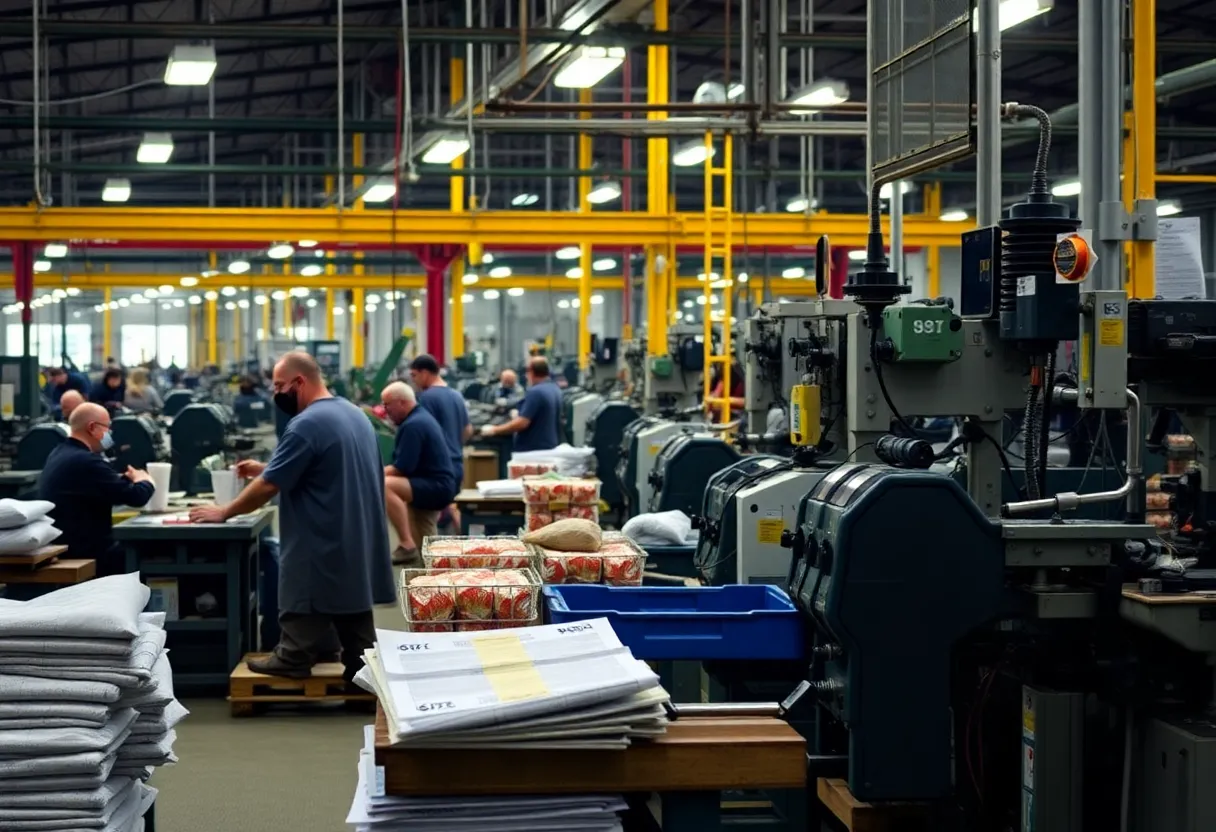News Summary
President Trump has announced new tariffs that will significantly affect foreign imports, including a 34% increase on goods from China. This move has sparked a divided response among Kentuckians, with experts warning of potential negative impacts on manufacturing jobs, consumer prices, and key industries such as agriculture and bourbon. Kentucky lawmakers express concern over the tariffs’ adverse economic effects, while supporters argue for the potential benefits of increased U.S. manufacturing capabilities.
Lexington, Kentucky – President Donald Trump has announced the implementation of significant new tariffs that will take effect immediately, establishing a base 10% increase on all foreign imports. These tariffs include a hefty 34% increase on imports from China, a 20% tax on goods from the European Union, and a 32% tax on products from Taiwan. The President claims that these measures will strengthen U.S. manufacturing capabilities and address perceived unfair trade practices.
However, concerns about the potential economic repercussions are rising among Kentucky leaders and citizens. Chief Economist Douglas Holtz-Eakin has pointed out that the decline in manufacturing jobs is primarily attributed to technological advancements rather than international trade. Economists warn that these new tariffs could lead to higher prices for consumers, affecting everyday goods and services.
Opinions among Kentucky residents are divided regarding the implications of the new tariffs. Some, like James Pelfrey, view the tariffs favorably, believing they might result in a greater availability of U.S.-made products. In contrast, others, such as John Webb, express concerns about the uncertainty these tariffs bring and their potential negative effects on the economy.
Unlike previous tariffs that mainly targeted China, these new measures cast a wider net, impacting trade relationships with traditional U.S. allies, including Canada and Mexico, which may have a more substantial economic impact on the North American economy. Lawmakers in Kentucky, including Senators Rand Paul and Mitch McConnell, have spoken out against the tariffs, predicting adverse effects on both the economy and consumers.
Senator Paul has highlighted that tariffs essentially function as taxes imposed on consumers, potentially harming multiple sectors, including housing and agriculture. Similarly, Senator McConnell has warned that these tariffs could lead to higher prices on consumer goods, adversely affecting industries vital to Kentucky, such as bourbon and automotive manufacturing.
The Kentucky Chamber of Commerce has also voiced opposition to the tariffs, arguing that they undermine established trade relationships and could cost consumers as much as $1,200 annually due to higher product prices. Commerce Lexington has echoed these concerns, particularly regarding the potential effects on key industries across the Greater Lexington Region.
Adding to the complexity, retaliatory tariffs from trade allies are expected, which could further heighten costs for American consumers. Trump’s announcement comes on the heels of previously imposed tariffs on various products from Mexico and Canada, with ongoing uncertainties regarding their potential repeal.
Supporters of these tariffs, including Representative Andy Barr, argue that they might lead to greater market access and promote free trade in the long run. However, critics counter that the unpredictable nature of the tariffs is likely to create economic instability and could dampen consumer spending, exacerbating inflation-related concerns amid rising essential good prices.
The Kentucky Export Initiative has reported that the state’s total exports have seen an increase from $25 billion to $40 billion between 2013 and 2023, underscoring Kentucky’s reliance on robust international trade relationships. Nevertheless, economic experts predict that the new tariffs could negatively impact Kentucky’s agricultural, bourbon, and automotive sectors due to increased production costs and possible retaliatory measures from trading partners.
As the situation evolves, the full ramifications of Trump’s tariff announcements remain uncertain, with Kentucky’s economy sitting at a pivotal crossroads regarding its trade strategies and the potential fallout for its residents.
Deeper Dive: News & Info About This Topic
HERE Resources
Lexington Ranked 24th in STI Rates in the U.S.
Trump’s Threats Spark Tensions with Iran
Trump to Announce Major Tariffs on Imports During ‘Liberation Day’
Trump Imposes 25% Tariffs on Car Imports
Canada’s Prime Minister Calls for Snap Election Amid Trade Tensions
Congressman Andy Barr Faces Protests Over Policies in Lexington
Trump Enacts 25% Tariffs on Steel and Aluminum Imports
Ontario Imposes 25% Surcharge on U.S. Electricity Exports
Mark Carney Elected Leader of Canada’s Liberal Party
Minnesota’s Budget Faces Significant Challenges Ahead
Additional Resources
- Kentucky.com: Tariffs Impact
- Wikipedia: Trade Policy of the United States
- WKYT: New Tariffs Impact on Kentucky
- Google Search: Kentucky tariffs
- Kentucky Lantern: Trade Policy Discussion
- Google Scholar: Tariffs Impact on Economy
- Spectrum News: Trade Review Act 2025
- Encyclopedia Britannica: Tariff
- Kentucky Lantern: UAW and Tariffs
- Google News: Trump Tariffs and Kentucky







